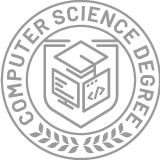Master’s Degrees in Computer Programming
Featured schools near , edit
Education Levels of Programming Majors
In 2020-2021, 378 master's degrees were awarded to programming majors. This earns it the #8 spot on the list of the most popular master's degree programs in the nation.
The following table shows the number of diplomas awarded in programming at each degree level.
| Education Level | Number of Grads |
|---|---|
| Basic Certificate | 4,106 |
| Associate Degree | 3,843 |
| Bachelor’s Degree | 2,330 |
| Undergraduate Certificate | 1,170 |
| Master’s Degree | 378 |
| Graduate Certificate | 112 |
Earnings of Programming Majors With Master’s Degrees
The median salary for graduates holding a master's degree in programming is $86,558. This number may vary for a lot of reasons. For instance, you may decide to move to a location where people with your degree are rare and make more money. To get a better picture, earnings for this category of people can range from a low of $86,558 to a high of $86,558.

Student Debt
The data on debt ranges for programming majors who have their master's degree is not available.
Student Diversity
More men than women pursue master's degrees in programming. About 72.0% of graduates in this field are male.
| Gender | Number of Grads |
|---|---|
| Men | 272 |
| Women | 106 |

The racial-ethnic distribution of programming master’s degree students is as follows:
| Race/Ethnicity | Number of Grads |
|---|---|
| Asian | 49 |
| Black or African American | 46 |
| Hispanic or Latino | 11 |
| White | 144 |
| International Students | 110 |
| Other Races/Ethnicities | 18 |

Most Popular Programming Programs for Master’s Degrees
There are 16 colleges that offer a master’s degree in programming. Learn more about the most popular 16 below:
DePaul University tops the list of the most popular school in the U.S. for programming majors who are seeking their master's degree. Each year, around 21,900 students seeking various degrees attend the university. The average in-state tuition for full-time undergraduates is $41,361 per year, while in-state graduate students, on average, pay $17,951 per year. During the 2020-2021 academic year, 132 people received their master's degree in programming from DePaul. About 25% of this group were women, and 25% were students from an underrepresented racial-ethnic group.
Maryville University of Saint Louis comes in at #2 on our list of the most popular colleges offering master's degrees in programming. Roughly 10,900 attend the school each year. The average in-state tuition for full-time undergraduates is $24,766 per year, while in-state graduate students, on average, pay $14,346 per year. The programming program at Maryville University of Saint Louis awarded 72 master's degrees during the 2020-2021 school year. Around 38% of these students were from an underrepresented racial-ethnic group, and 26% were women.
University of Chicago comes in at #3 on our list of the most popular colleges offering master's degrees in programming. Roughly 17,800 attend the school each year. The average in-state tuition for full-time undergraduates is $59,256 per year, while in-state graduate students, on average, pay $62,640 per year. For the 2020-2021 academic year, 57 master's degrees were handed out to programming majors at UChicago. About 49% of this group were women, and 16% were students from an underrepresented racial-ethnic group.
The 4th most popular school in the country for programming majors who are seeking their master's degree is Maharishi International University. Roughly 2,000 attend the school each year. The average in-state tuition for full-time undergraduates is $16,000 per year, while in-state graduate students, on average, pay $32,000 per year. During the 2020-2021 academic year, 28 people received their master's degree in programming from MIU. Of these students, 18% were women and 93% were members of underrepresented racial-ethnic groups.
DigiPen Institute of Technology is the 5th most popular school in the nation for students seeking a master's degree in programming. Each year, around 1,100 students seeking various degrees attend the university. The average in-state tuition for full-time undergraduates is $34,700 per year, while in-state graduate students, on average, pay $29,100 per year. The programming program at DigiPen Institute of Technology awarded 24 master's degrees during the 2020-2021 school year. About 13% of this group were women, and 13% were students from an underrepresented racial-ethnic group.
Marist College comes in at #6 on our list of the most popular colleges offering master's degrees in programming. Roughly 6,600 attend the school each year. The average in-state tuition for full-time undergraduates is $40,675 per year, while in-state graduate students, on average, pay $15,660 per year. The programming program at Marist College awarded 15 master's degrees during the 2020-2021 school year. Around 20% of these students were from an underrepresented racial-ethnic group, and 13% were women.
University of Michigan - Dearborn comes in at #7 on our list of the most popular colleges offering master's degrees in programming. Each year, around 8,700 students seeking various degrees attend the university. The average in-state tuition for full-time undergraduates is $13,416 per year, while in-state graduate students, on average, pay $14,110 per year. The programming program at University of Michigan - Dearborn awarded 13 master's degrees during the 2020-2021 school year. Around 31% of these students were from an underrepresented racial-ethnic group, and 31% were women.
University of Detroit Mercy is the 8th most popular school in the nation for students seeking a master's degree in programming. Each year, around 4,900 students seeking various degrees attend the university. The average in-state tuition for full-time undergraduates is $30,154 per year, while in-state graduate students, on average, pay $21,276 per year. The programming program at University of Detroit Mercy awarded 9 master's degrees during the 2020-2021 school year. About 56% of this group were women, and 11% were students from an underrepresented racial-ethnic group.
Youngstown State University is the 8th most popular school in the nation for students seeking a master's degree in programming. Each year, around 11,800 students seeking various degrees attend the university. The average in-state tuition for full-time undergraduates is $9,196 per year, while in-state graduate students, on average, pay $6,453 per year. For the 2020-2021 academic year, 9 master's degrees were handed out to programming majors at Youngstown State University.
The 10th most popular school in the country for programming majors who are seeking their master's degree is Clemson University. Each year, around 26,400 students seeking various degrees attend the university. The average in-state tuition for full-time undergraduates is $14,118 per year, while in-state graduate students, on average, pay $10,600 per year. During the 2020-2021 academic year, 8 people received their master's degree in programming from Clemson. Of these students, 25% were women and 13% were members of underrepresented racial-ethnic groups.
Brandeis University is the 11th most popular school in the nation for students seeking a master's degree in programming. Roughly 5,400 attend the school each year. The average in-state tuition for full-time undergraduates is $59,408 per year, while in-state graduate students, on average, pay $53,498 per year. For the 2020-2021 academic year, 6 master's degrees were handed out to programming majors at Brandeis. Around 17% of these students were from an underrepresented racial-ethnic group, and 33% were women.
Aspen University comes in at #12 on our list of the most popular colleges offering master's degrees in programming. Each year, around 9,500 students seeking various degrees attend the university. The average in-state tuition for full-time undergraduates is $4,545 per year, while in-state graduate students, on average, pay $3,900 per year. During the 2020-2021 academic year, 5 people received their master's degree in programming from Aspen University. Of these students, 20% were women and 40% were members of underrepresented racial-ethnic groups.
Programming Concentrations
| Major | Annual Degrees Awarded |
|---|---|
| General Computer Programming | 212 |
| Specific Application Programming | 96 |
| Other Computer Programming | 63 |
| 7 |
Explore Major by State
Alabama
Arkansas
Connecticut
Florida
Idaho
Iowa
Louisiana
Massachusetts
Mississippi
Nebraska
New Jersey
North Carolina
Oklahoma
Rhode Island
Tennessee
Vermont
West Virginia
Related Majors
Below are some popular majors that are similar to programming that offer master’s degrees.
| Major | Annual Degrees Awarded |
|---|---|
| Computer Information Systems | 18,992 |
| Computer Science | 14,364 |
| Information Technology | 9,181 |
| Information Science | 6,396 |
| Computer Software Applications | 3,555 |
References
*The racial-ethnic minority student count is calculated by taking the total number of students and subtracting white students, international students, and students whose race/ethnicity was unknown. This number is then divided by the total number of students at the school to obtain the percentage of racial-ethnic minorities.
- College Factual
- National Center for Education Statistics
- O*NET Online
- Bureau of Labor Statistics
- Image Credit: By luis gomes under License
More about our data sources and methodologies.
Featured Schools
 Request Info
Request Info
|
Southern New Hampshire University You have goals. Southern New Hampshire University can help you get there. Whether you need a bachelor's degree to get into a career or want a master's degree to move up in your current career, SNHU has an online program for you. Find your degree from over 200 online programs. Learn More > |









